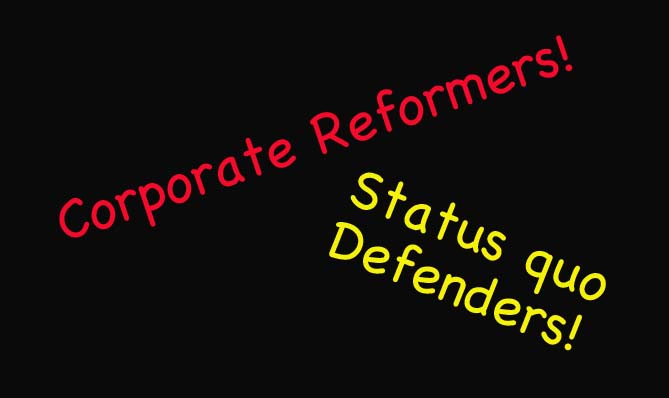Is the Term "Corporate Reformer" a Personal Attack?

By John Thompson.
Larry Cuban’s contribution to the American Enterprise Institute’s conference of edu-philanthropy, Is the ‘New’ Education Philanthropy Good for Schools?, is nuanced and wise. One of the predictions in Cuban’s “A Thoughtful Critique of Contemporary Edu-Giving” is:
Other current reforms such as evaluating teachers on the basis of test scores, ending tenure and seniority, calling principals CEOs, and children learning to code will be like tissue-paper reforms of the past (e.g., zero-based budgeting, right- and left-brain teaching) that have been crumpled up and tossed away.
Consistent with the insights of other contributors to the AEI conference, Cuban explained:
Like most educational policymakers, donors have largely lived in their own world where idées fixes about school problems—better schooling strengthens the economy, schools are like businesses, and successful business practices can fix any problems schools have—dominate their thinking. These shared ideas spurred grants for reforming structures, allocating ample resources, and scaling up successful ventures. And the world that practitioners live in—a world of different idées fixes and behaviors—is crucial for policies to turn into classroom practices, but donors have largely ignored it.
So, I can’t believe I’m quarreling with one of Cuban’s points. He takes a long term view of education history as he rejects the term “corporate reform.” It supposedly implies “absolute certainty about reformers’ motives,” along with implying “a smell of conspiratorial decision-making.” The label is used in conjunction with “much of the back-and-forth about who is and who is not a ‘corporate reformer,’” and it “thrives on venomous personal attacks.”
Not wanting to use the term in a way that Larry Cuban might read as “hyperbole,” I’ve gone back and forth, wondering if I should use “corporate reform.” I’ve never fully understood why the label offends reformers so much; I’d think the word “elite” is more harsh and both names seem so mild in comparison to the charges (I’d say slanders) that reformers routinely hurl at teachers who disagree with them. But, since reading Cuban’s position, I’ve often edited the term from my blogging – even though I’ve sometimes reinserted the words because they seemed to be the best name for what I was describing.
At least for now, I stopped playing Hamlet with the words after reading “The Backlash Against Reform Philanthropy,” by Michael McShane and Jenn Hatfield. McShane and Hatfield investigate the liberal, moderate, and conservative critics of edu-philanthropy who “oppose education philanthropy because of what philanthropists are pushing, who is pushing it, why they are pushing it, and how they are pushing it.”
McShane and Hatfield find:
All of our respondents had some form of concern about standardized testing. Interestingly, their criticisms struck a common chord. They believed that tests were not an accurate measurement of everything they want children to know, and that the more reliant accountability systems are on tests, the more education becomes homogenized.
Conservatives tend to support charters but liberals, like Diane Ravitch, criticize the “foundations’ failure to question whether there might be negative effects of charters [that] could result in a fully privatized Is the Term "Corporate Reformer" a Personal Attack? - Living in Dialogue:
